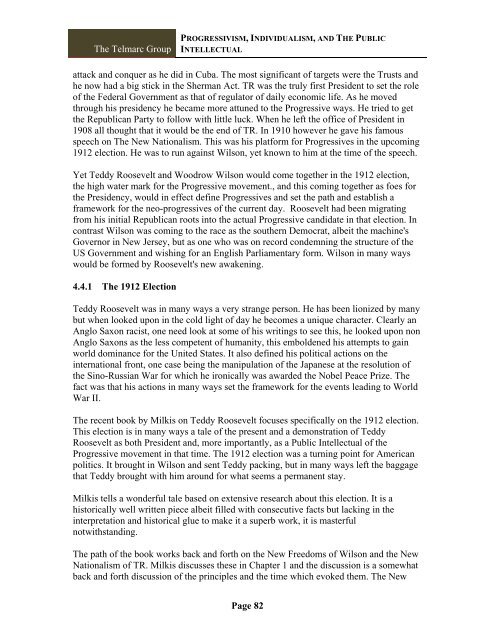progressivism, individualism, and the public ... - Telmarc Group
progressivism, individualism, and the public ... - Telmarc Group
progressivism, individualism, and the public ... - Telmarc Group
Create successful ePaper yourself
Turn your PDF publications into a flip-book with our unique Google optimized e-Paper software.
The <strong>Telmarc</strong> <strong>Group</strong><br />
PROGRESSIVISM, INDIVIDUALISM, AND THE PUBLIC<br />
INTELLECTUAL<br />
attack <strong>and</strong> conquer as he did in Cuba. The most significant of targets were <strong>the</strong> Trusts <strong>and</strong><br />
he now had a big stick in <strong>the</strong> Sherman Act. TR was <strong>the</strong> truly first President to set <strong>the</strong> role<br />
of <strong>the</strong> Federal Government as that of regulator of daily economic life. As he moved<br />
through his presidency he became more attuned to <strong>the</strong> Progressive ways. He tried to get<br />
<strong>the</strong> Re<strong>public</strong>an Party to follow with little luck. When he left <strong>the</strong> office of President in<br />
1908 all thought that it would be <strong>the</strong> end of TR. In 1910 however he gave his famous<br />
speech on The New Nationalism. This was his platform for Progressives in <strong>the</strong> upcoming<br />
1912 election. He was to run against Wilson, yet known to him at <strong>the</strong> time of <strong>the</strong> speech.<br />
Yet Teddy Roosevelt <strong>and</strong> Woodrow Wilson would come toge<strong>the</strong>r in <strong>the</strong> 1912 election,<br />
<strong>the</strong> high water mark for <strong>the</strong> Progressive movement., <strong>and</strong> this coming toge<strong>the</strong>r as foes for<br />
<strong>the</strong> Presidency, would in effect define Progressives <strong>and</strong> set <strong>the</strong> path <strong>and</strong> establish a<br />
framework for <strong>the</strong> neo-progressives of <strong>the</strong> current day. Roosevelt had been migrating<br />
from his initial Re<strong>public</strong>an roots into <strong>the</strong> actual Progressive c<strong>and</strong>idate in that election. In<br />
contrast Wilson was coming to <strong>the</strong> race as <strong>the</strong> sou<strong>the</strong>rn Democrat, albeit <strong>the</strong> machine's<br />
Governor in New Jersey, but as one who was on record condemning <strong>the</strong> structure of <strong>the</strong><br />
US Government <strong>and</strong> wishing for an English Parliamentary form. Wilson in many ways<br />
would be formed by Roosevelt's new awakening.<br />
4.4.1 The 1912 Election<br />
Teddy Roosevelt was in many ways a very strange person. He has been lionized by many<br />
but when looked upon in <strong>the</strong> cold light of day he becomes a unique character. Clearly an<br />
Anglo Saxon racist, one need look at some of his writings to see this, he looked upon non<br />
Anglo Saxons as <strong>the</strong> less competent of humanity, this emboldened his attempts to gain<br />
world dominance for <strong>the</strong> United States. It also defined his political actions on <strong>the</strong><br />
international front, one case being <strong>the</strong> manipulation of <strong>the</strong> Japanese at <strong>the</strong> resolution of<br />
<strong>the</strong> Sino-Russian War for which he ironically was awarded <strong>the</strong> Nobel Peace Prize. The<br />
fact was that his actions in many ways set <strong>the</strong> framework for <strong>the</strong> events leading to World<br />
War II.<br />
The recent book by Milkis on Teddy Roosevelt focuses specifically on <strong>the</strong> 1912 election.<br />
This election is in many ways a tale of <strong>the</strong> present <strong>and</strong> a demonstration of Teddy<br />
Roosevelt as both President <strong>and</strong>, more importantly, as a Public Intellectual of <strong>the</strong><br />
Progressive movement in that time. The 1912 election was a turning point for American<br />
politics. It brought in Wilson <strong>and</strong> sent Teddy packing, but in many ways left <strong>the</strong> baggage<br />
that Teddy brought with him around for what seems a permanent stay.<br />
Milkis tells a wonderful tale based on extensive research about this election. It is a<br />
historically well written piece albeit filled with consecutive facts but lacking in <strong>the</strong><br />
interpretation <strong>and</strong> historical glue to make it a superb work, it is masterful<br />
notwithst<strong>and</strong>ing.<br />
The path of <strong>the</strong> book works back <strong>and</strong> forth on <strong>the</strong> New Freedoms of Wilson <strong>and</strong> <strong>the</strong> New<br />
Nationalism of TR. Milkis discusses <strong>the</strong>se in Chapter 1 <strong>and</strong> <strong>the</strong> discussion is a somewhat<br />
back <strong>and</strong> forth discussion of <strong>the</strong> principles <strong>and</strong> <strong>the</strong> time which evoked <strong>the</strong>m. The New<br />
Page 82












